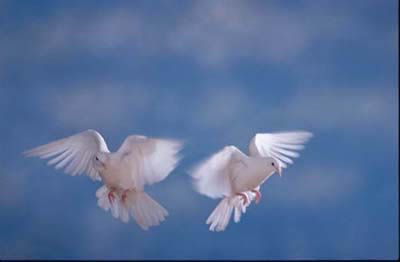
Believe The Nostalgia Of The Future
I just wanted to take a moment to share the thoughts I had in reading the latter half of "The Ecology of War and Peace", which has really influenced me and helped me to see the ecologies of war and peace in a much more complete way. Again, I just wanted to share some tame thoughts.

The very first thing that struck me in reading the latter half of “The Ecology of War and Peace” was how war is indeed ironic, yet often it is not a synonym that is attached to the concept. Ever since I was 11 years old I may have been isolated from politics and wanting nothing to do with them, but it wasn’t difficult for me to feel that war is the ultimate mistake and tragedy of mankind, and seeing how it goes on and on and more wars follow and spawn out of it, I indeed find myself to this day bewildered by the mindset of war, and though I didn’t think of the adjective "ironic" to war then, I had always believed war is contradictory to what it claims to promise.
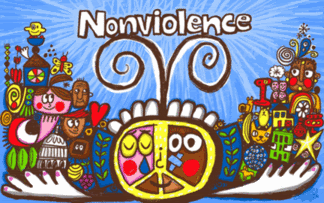
This thought basically ties back into what I was talking about last week, in my belief that those who currently insist, as Reagen believed during his presidency when proposing a $1.5 trillion Pentagon build-up and insisting in defense of the proposal, "Defense is not a budget issue." that these billions being funneled into the Department of Defense and other military sects HAVE to be for the sake of "national defense", are merely dangerously cynical. I can’t help but believe that many proponents of these foreign policies truly do recognize the irony, but stay the course under two conditions challenging the architects of an ecology of peace; 1) they look to where long efforts of diplomatic negotiations have failed, including Northern Ireland and Southeast Asia and display them as a backdrop projection in assumption they commonly don’t work, and 2) the small handful of dissenters among a unanimously large peaceful protest/dissent body on the left which resort to violent forms of protest and exploit the values held by the architects of the peace ecology, which give the impression to mainstream America of "false irony" to what the pro-peace, anti-war activists truly believe at large.
War is mankind’s greatest irony, in my opinion. There continue to be ongoing foreign efforts to protect modest amounts of cheap oil, yet "a U.S-made F-16 fighter warplane burns more fuel in an hour than the average U.S car does in one year." (Hastings 97). Modern-day war proponents claim that the deadly deed is being done to liberate citizens in struggling parts of the world from tyranny, yet the most innocent are the ones most at risk in losing their sovereignties, integrities and cultural identities and traditions in result of global oligarchy, which inevitably results in ethnic wars and "promotes an increasing disintegration of the basic warp and woof of social fabric." (Hastings 91). And other claims around those lines.
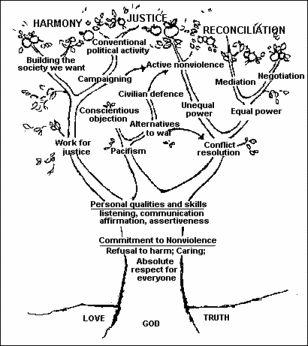
Simply in analyzing the infrastructure of these contradictions, we can indeed "use" this infrastructure and with mental feng shui reveal the contradictions in promoting this ecology of peace. Despite the pitchblende of cynicism lodged deep in the hearts and minds of many of our elected leaders, I am deeply optimistic we can architect this ecology of peace. Reasonably, it will be a long and thorough process to achieve the fullest promise of an ecology of peace, for peace is not myopic, it’s a permanence, a way of being. Hearing these words can make anyone feel as though it’s too much to handle, but many selfless demonstrations and projects in recent memory have sinewed my optimistic belief that the single most important ingredient in making the pilot light of peace blink, faith, is alive and kicking! :)
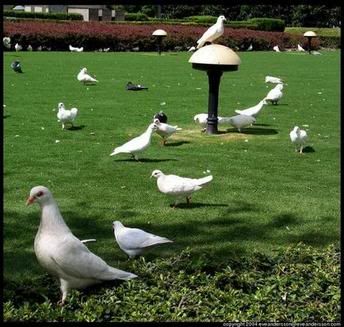
I absolutely agreed when Hastings said at the beginning of Section 4 that a "too-often-overlooked, element of building an immunological response to violence and the despair attending it is the relief of laughter, the appreciation of the absurd." (Hastings 100). My grandmother always told me as a boy a proverb that still glares deep in my heart and influences every fiber of my being; it was Jean Houston who said, "At the height of laughter, the universe is flung into a kaleidoscope of new possibilities." I couldn’t agree with what she said more, and indeed I can understand how many would find it unlikely that solving these cynicisms of the world begin with laughter. In my experience on the streets, where I have often protested with others, it does sadden me to see some protesters wearing all-black, with charcoal shavings smeared on their cheeks and nose, with their faces staring down at the concrete as they walk, self-reserved, unwilling to have a conversation and when they do speak, they speak angry slogans even at those marching with them.

I believe it is out of this same behavior that another breed of cynicism is created, which is unhealthy for this ecology and only delays the full potential of the peace movement. Anger and urgency are absolutely essential in providing the impulse, the spiking horse of this ecology, but I’ve long believed that it must be disciplined and fused into positive energy in order to make good use of it. This notion has influenced me particularly from the lyrical genius of Bruce Cockburn, who has for decades eloquently vented the frustrations of society in his music from "Call It Democracy" to "If I Had A Rocket Launcher", has also always been an optimist, and a recent February 2005 interview he ran with David Barsamian of The Progressive has influenced my behavior of approaching society to this day:
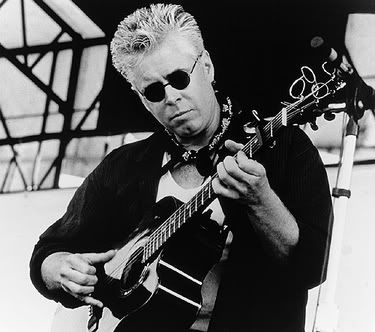
"We all grow up with anger. It’s part of the human condition. But what do you do with that? It seems obvious to me that you’ve got to use it for something, but you have to separate it from your ego. Once you tie anger and ego together then you’re a monster, at least a latent one. So you have to be able to separate those things before you are going to be able to do anything useful with your anger. And you have to be able to sit back and say, yeah, I’m really mad about this but I’m only one of 10,000 people who might be mad about that particular thing and everyone has a slightly different take on it. We can all benefit from hearing each other’s takes on these things. Anger is energy, and you’ve got to find a place to put it that works for you."
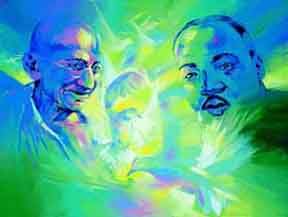
I believe you’ve got to be angry, you’ve got to be upset, but, most importantly, you’ve got to convert it into positive energy. Indeed our most admired cultural icons had that integrity, from Dr. Martin Luther King Jr. to Mother Teresa, and I believe we must carry on that sort of example for the pillars of this ecology of peace to weather any storm of lassitude that could crush the spirit of the undisciplined conscious spirit.
We must treat the desire not as a material means, or even a lifetime commitment, but as the way of life that Dr. Kenneth Kaunda of Zambia’s Kaunda Institute for Peace and Democracy calls for. Indeed "the courage and intense training and organization that are always a potential in the nonviolent movements, coupled with good conflict resolution techniques, are the best bet to save our sweet home, Mother Earth." (Hastings 117). In providing the case for a "practical ecology" (Hastings 120) we can indeed prevail. From the long-powerful non-nuclear influence in the Southeast Pacific that has become the "South Pacific Nuclear Free Zone" to the mass popular appeal of millions of conscious citizens worldwide in the Abolition 2000 campaign, their spirit and enthusiasm reinforces my optimistic demeanor, and proud hope that indeed, as King pondered, "a new spirit is rising among us."
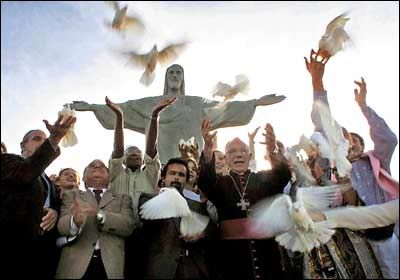
The Chicago Tribune once wrote, "Optimists are nostalgic about the future." Indeed I feel I have long lived and breathed with the ecofeminist soul that many often feel is long dead, and I believe with this foundation of courage, this spirit can come back to dance with us all. Let us embrace one another, achieve fullest diversity in weaving our dreams for a peaceful future together in the thaumaturgic tapestry of community, and become the very stewards of peace we’re born to be.
"Si pacem, si pacem!"
Love,
Noah Eaton
(Mistletoe Angel)
(Emmanuel Endorphin)










































0 Comments:
Post a Comment
<< Home